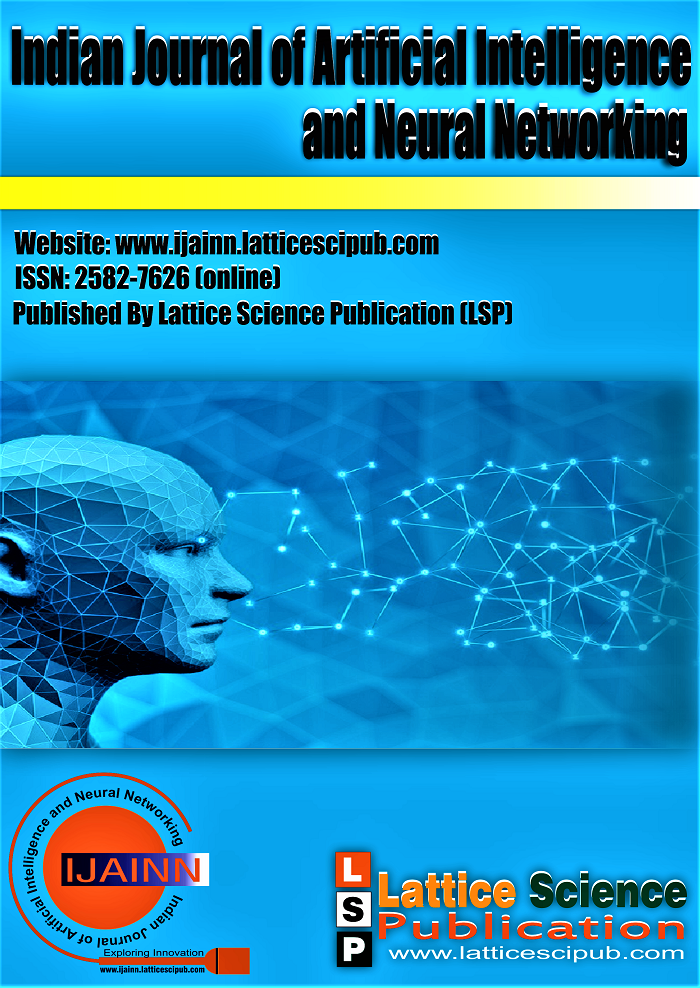Artificial Intelligence in Energy Research and Climate Change
Main Article Content
Abstract
Artificial intelligence (AI) plays a pivotal role in addressing climate change by accelerating energy research and aligning with global initiatives towards a sustainable future, with a notable focus on India, the world's fourth-largest economy, which is on track to become the third-largest economy. As a developing nation struggling with energy demand and climate adaptation/resilience, India stands at the convergence of innovation and necessity. This research paper presents the integration of AI technologies in optimising energy resources and enhancing grid efficiency in relation to climate patterns. Leveraging AI-driven solutions, one can transform the Indian energy sector by predicting energy demand/consumption, managing resources, and minimising carbon footprints. AI shall / may transform energy research in the following direction.
▪ Smart grids and energy optimization
▪ Energy distribution efficiency
▪ Reducing losses through integration with clean and renewable energy resources
India, with its continued excellence in science and technology, needs to play a leading role in global AI collaborations. This association involves the inclusion of globally renowned organisations, such as the United Nations Development Programme (UNDP), the International Energy Agency (IEA), and the Conference of the Parties (COP) under the banner of the United Nations Framework Convention on Climate Change (UNFCCC), considering all aspects that govern solutions for global climate change through AI. The methodological approach focuses on accelerating the integration of artificial intelligence in managing energy resources and addressing climate change. Last but not least, AI can be considered an effective and affordable system-based tool that, along with emerging technologies, effectively addresses the challenges of climate change mitigation plans.
Downloads
Article Details

This work is licensed under a Creative Commons Attribution-NonCommercial-NoDerivatives 4.0 International License.
How to Cite
References
DeLuque and Shittu, E., 2019, Generation capacity expansion under demand, capacity factor and environmental policy uncertainties. Comput. Ind. Eng., 127 (2019), pp. 601-613, DOI: https://doi.org/10.1016/j.cie.2018.10.051
Pourahmadi, F., Hosseini, S. H., Dehghanian, P., Shittu, E. and Fotuhi-Firuzabad, M., 2020, Uncertainty cost of stochastic producers: Metrics and impacts on power grid flexibility. IEEE Trans. Eng. Manage, 69 (3), pp. 708-719, DOI: https://doi.org/10.1109/TEM.2020.2970729
Pan, W., & Shittu, E. (2023). Policies and power systems resilience under a time-based stochastic process of contingencies in networked microgrids. IEEE Trans. Eng. Manage, DOI: https://doi.org/10.1109/TEM.2023.3325188.
Deluque, I., Shittu, E. and Deason, J., 2018, Evaluating the reliability of efficient energy technology portfolios. EURO J. Decis. Process, 6 (1–2), pp. 115-138, DOI: https://doi.org/10.1007/s40070-018-0077-4
Deluque, I., Shittu, E. and Deason, J., 2018, Evaluating the reliability of efficient energy technology portfolios. EURO J. Decis. Process, 6 (1–2), pp. 115-138, DOI: https://doi.org/10.1007/s40070-018-0077-4
Gai, D. H. B., Ogunrinde, O. and Shittu, E., 2020. Self-reporting firms: Are emissions truly declining for improved financial performance? IEEE Eng. Manag. Rev., 48 (1), pp. 163-170, DOI: https://doi.org/10.1109/EMR.2020.2969405
Gai, D. H. B., Shittu, E., Attanasio, D., Weigelt, C., LeBlanc, S. and Dehghanian, P., 2021, Examining community solar programs to understand accessibility and investment: Evidence from the U.S. Energy Policy, 159,
DOI: https://doi.org/10.1016/j.enpol.2021.112600
Wang, T., Deason, J. and Shittu, E., 2024, The interplay of incentives, electricity price and demand on transport decarbonization: the case of electric vehicles in the U.S., IEEE Eng. Manag. Rev, DOI: https://doi.org/10.1109/EMR.2023.3347147
Sun, S., Cao, Z., Zhu, H. and Zhao, J., 2019, A survey of optimization methods from a machine learning perspective. IEEE Trans. Cybern. 50 (8), pp. 3668-3681, DOI: https://doi.org/10.48550/arXiv.1906.06821
Kotsilieris, T, Anagnostopoulos, I. and Livieris, I. E., 2022, Special issue: Regularization techniques for machine learning and their applications. Electronics, 2079-9292, 11 (4), DOI: https://doi.org/10.3390/electronics11040521
Xin, M. and Wang, Y., 2019, Research on image classification model based on deep convolution neural network. EURASIP J. Image Video Process, (1), DOI: https://doi.org/10.1186/s13640-019-0417-8
Sarker, I. H., 2021, Deep learning: a comprehensive overview on techniques, taxonomy, applications and research directions. SN Comput. Sci., 2 (6), p. 420, DOI: https://doi.org/10.1007/s42979-021-00815-1
Khan, P. W., Byun, Y. C., Lee, S. J., Kang, D. H., Kang, J. Y. and Park, H. S., 2020, Machine learning-based approach to predict energy consumption of renewable and non-renewable power sources. Energies, 13 (18), p. 4870, Publisher: MDPI,
DOI: https://doi.org/10.3390/en13184870
Lucas, A., Pegios, K., Kotsakis, E. and Clarke, D., 2020, Price forecasting for the balancing energy market using machine-learning regression. Energies, 13 (20), p. 5420, Publisher: MDPI, DOI: https://doi.org/10.3390/en13205420
Labe, Z. M. and Barnes, E. A., 2021, Detecting climate signals using explainable AI with single-forcing large ensembles—Journal of Advanced Modelling Earth System, 13 (6), DOI: https://doi.org/10.1029/2021MS002464
Mansfield, L. A., Nowack, P. J., Kasoar, M., Everitt, R. J., Collins, W. J. and Voulgarakis, A., 2020, Predicting global patterns of long-term climate change from short-term simulations using machine learning. Npj. Clim. Atmos. Sci., 2397-3722, 3 (1), p. 44,





